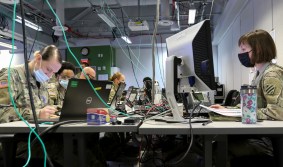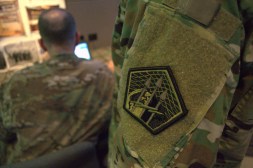U.S. military rebooting ISIL-focused cyberwar task force


Lt. Gen Edward Cardon, pictured here in April, is leading the approximately 100-person strong task force.
The U.S. military has established a special cyberwar task force at U.S. Cyber Command in Fort Meade, Md., to carry out cyberattacks against ISIS in Syria and Iraq after disappointment over initial cyber efforts, reports said Friday.
The approximately 100-person strong task force, codenamed Ares, is headed by the commander of the U.S. Army’s cyberwar efforts, Lt. Gen. Edward Cardon, the Washington Post reported.
Citing anonymous defense officials, the paper says Secretary of Defense Ashton Carter was “unhappy with the effectiveness of the early efforts against the Islamic State, leading to the creation of the dedicated unit led by Cardon.”
The U.S. cyber campaign against ISIS is the first publicly declared military operation online by any nation, the paper notes. It does not mention the various undeclared cyber campaigns that have been run to support Russian military operations, such as in Georgia in 2008.
The Post reports it isn’t part of the task force’s mission to choose individual ISIS leaders to be targeted in airstrikes.
“Cyberattacks occurring under the new task force might, for instance, disrupt a payment system, identify a communications platform used by Islamic State members and knock it out, or bring down Dabiq, the Islamic State’s online magazine,” the Post said.
One key objective of the group is to more closely align the work of U.S. cyberwar specialists at Fort Meade with U.S. Central Command, headquartered in Tampa, Florida, which is in charge of the conventional military campaign.
Closer cooperation would help commanders, for instance, by enabling them the chance to achieve a military objective, such as crippling a communications network, by digital, rather than explosive means — potentially reducing the risk of civilian casualties.






